General, Sir John Monash, Personal Files Book 21, 25 November - 31 December 1918 - Part 8
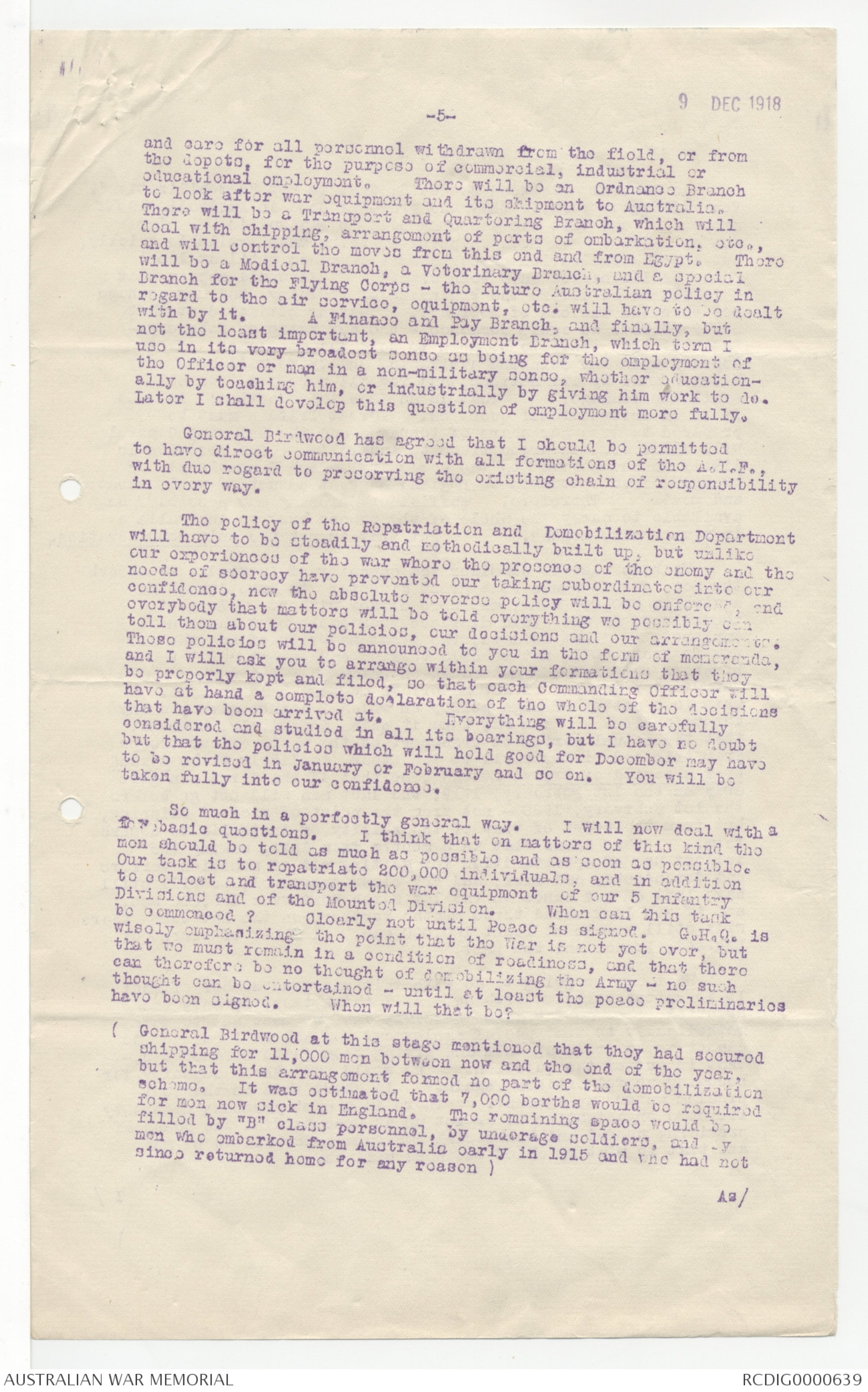
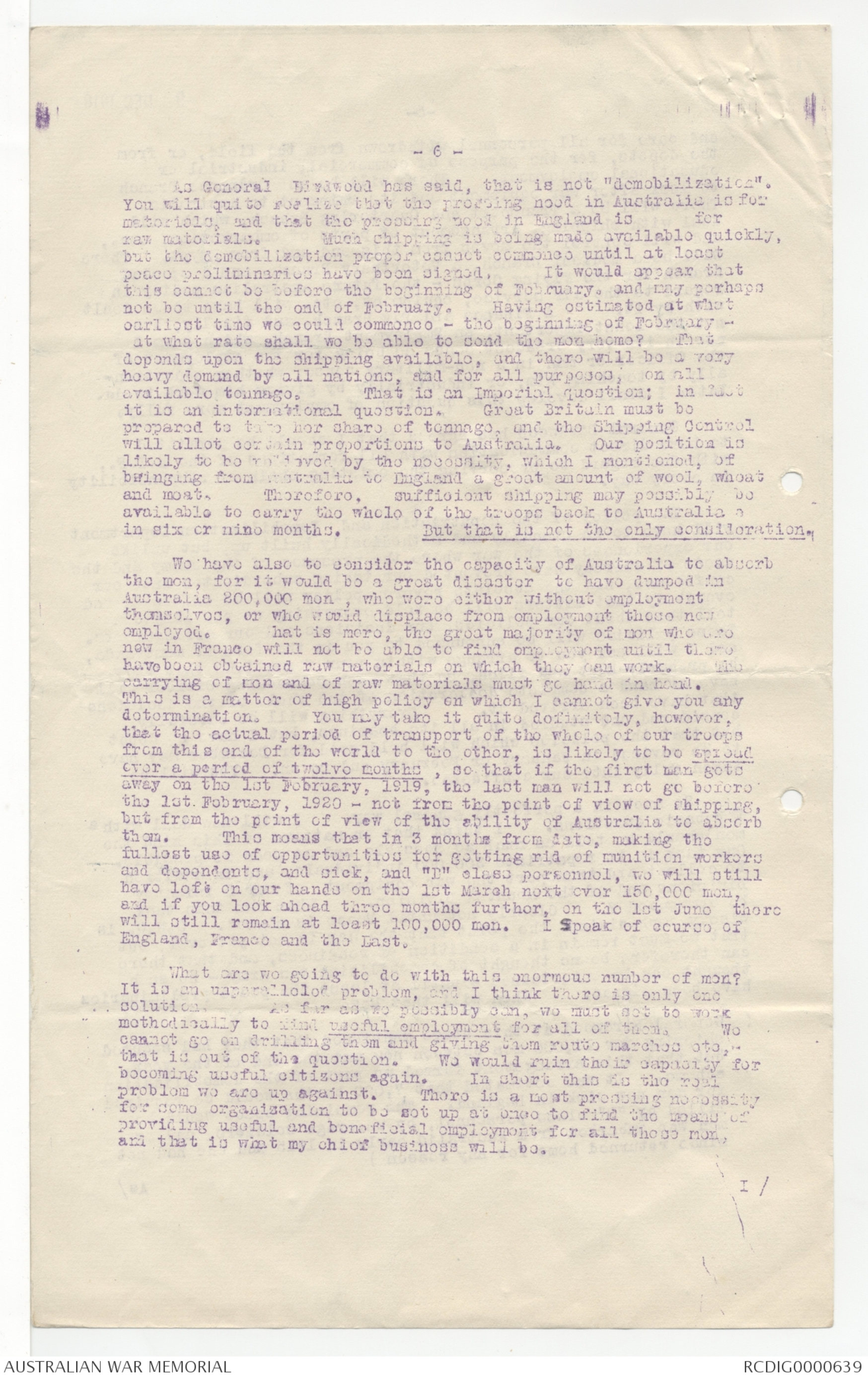
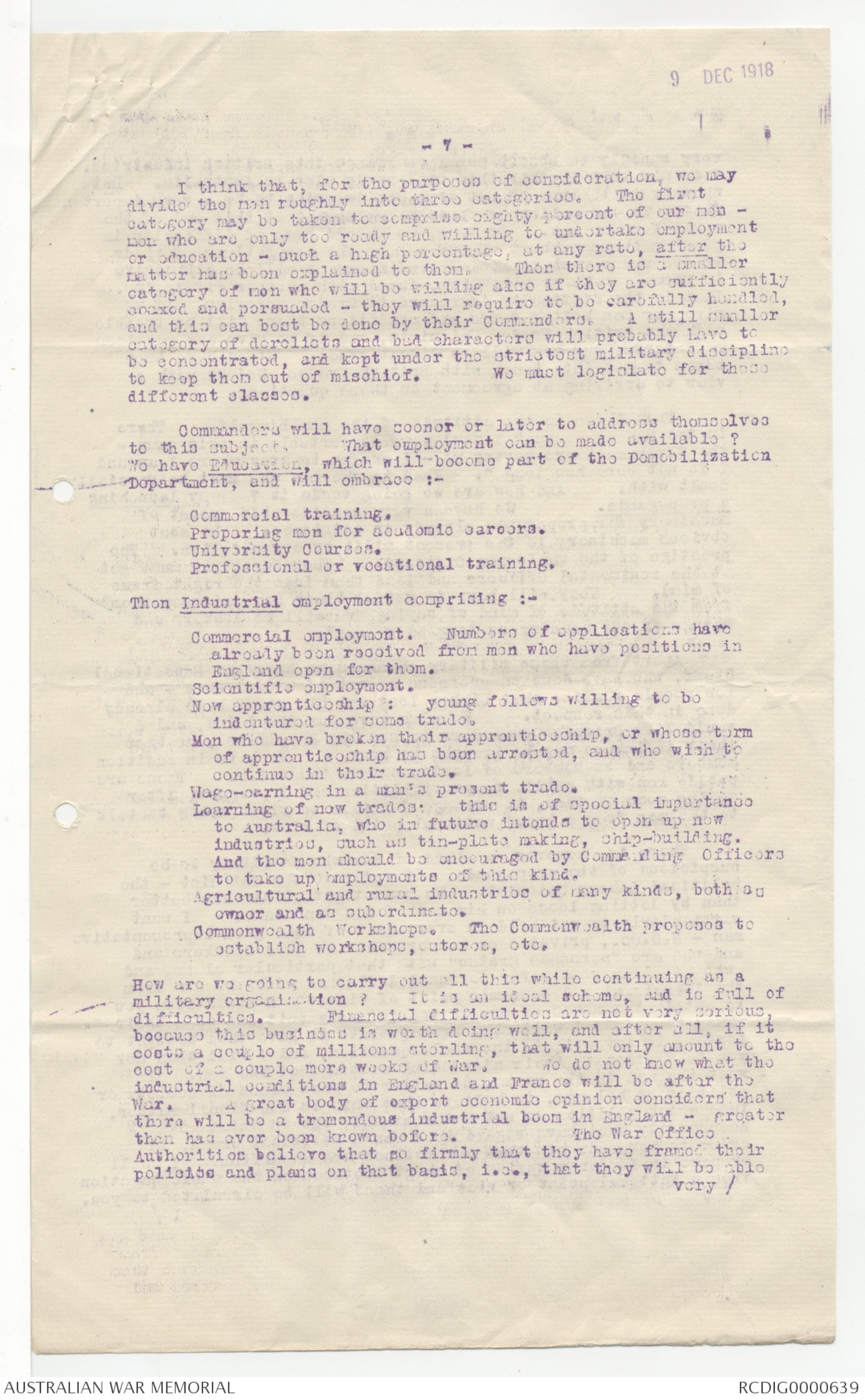
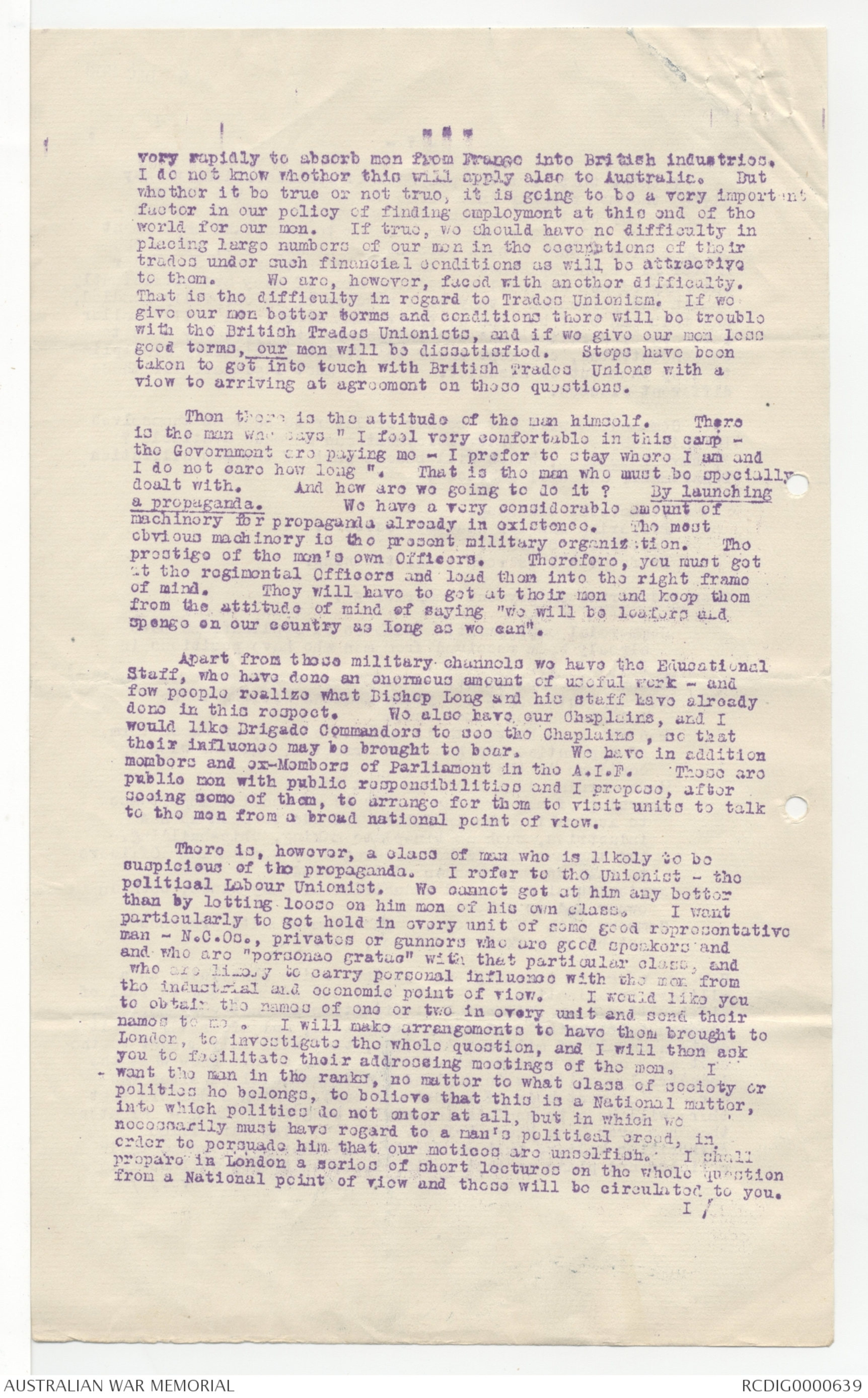
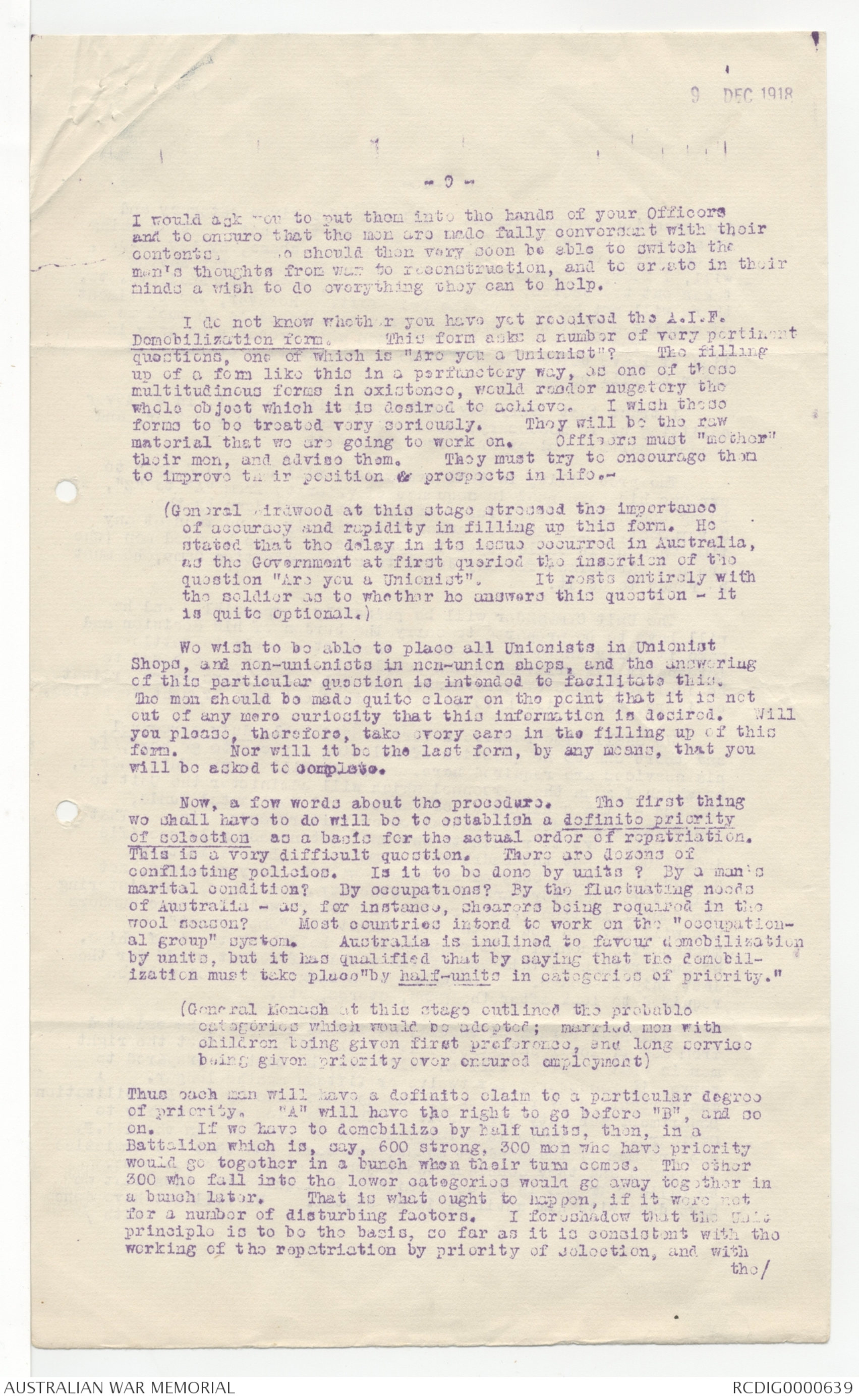
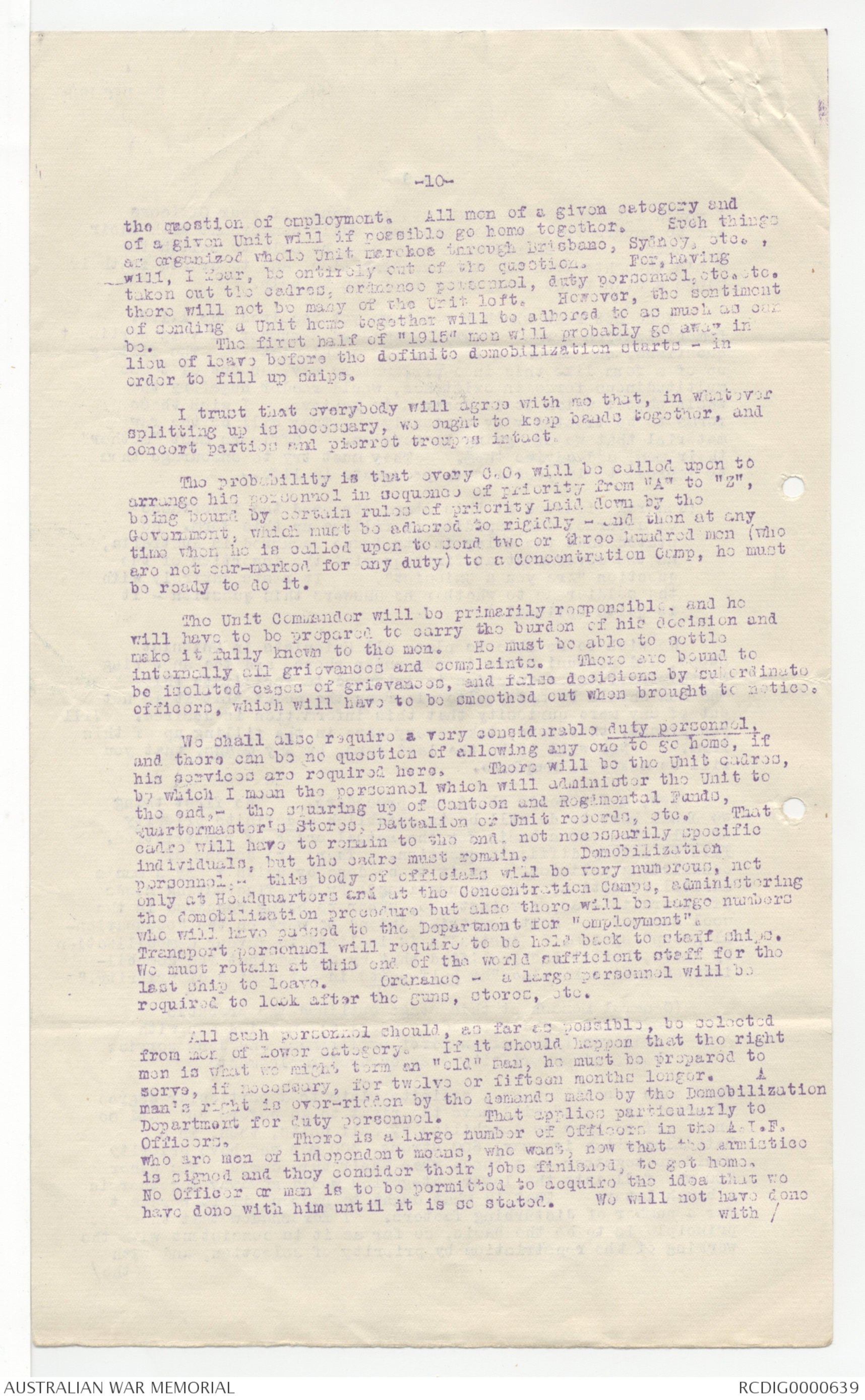
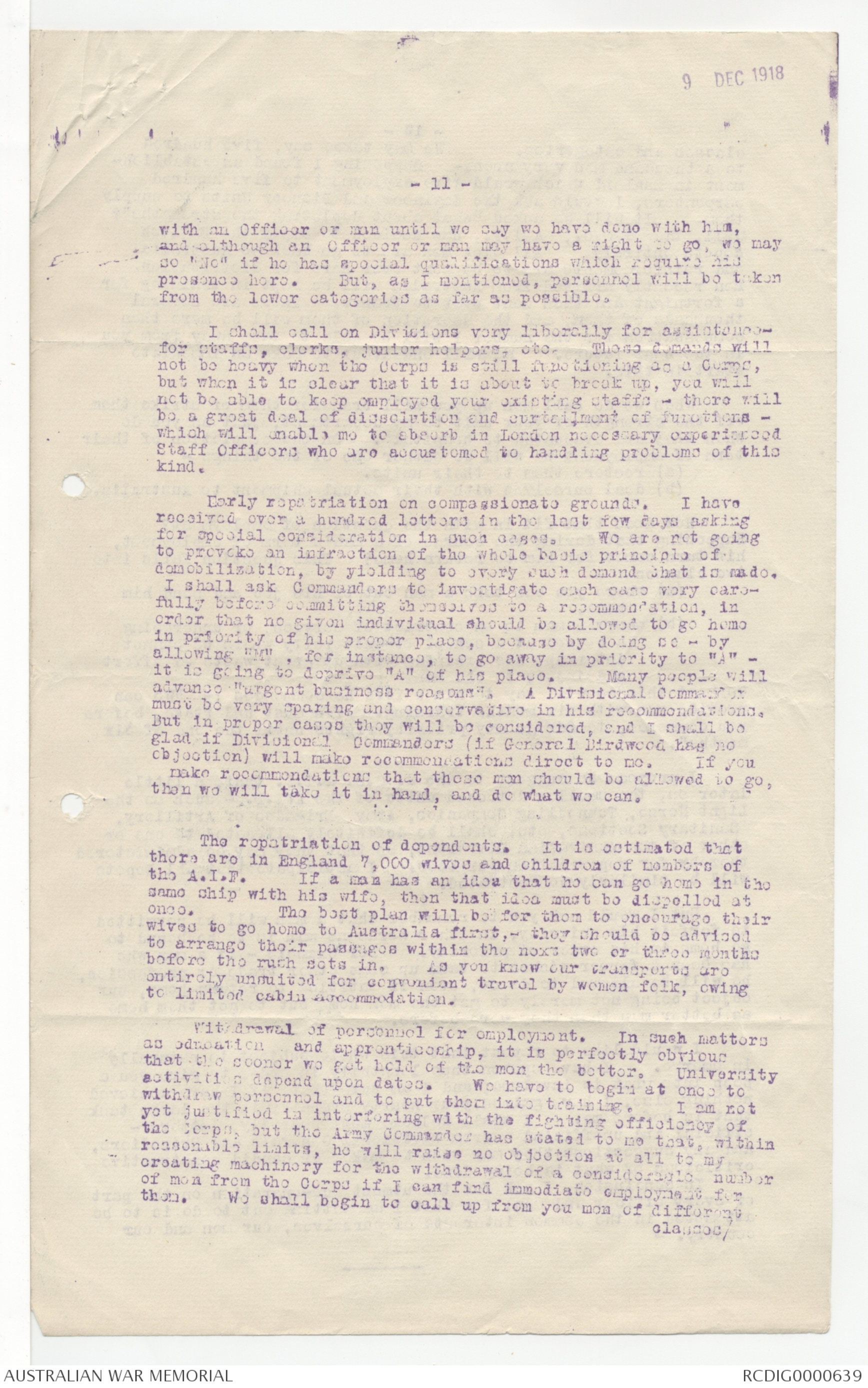
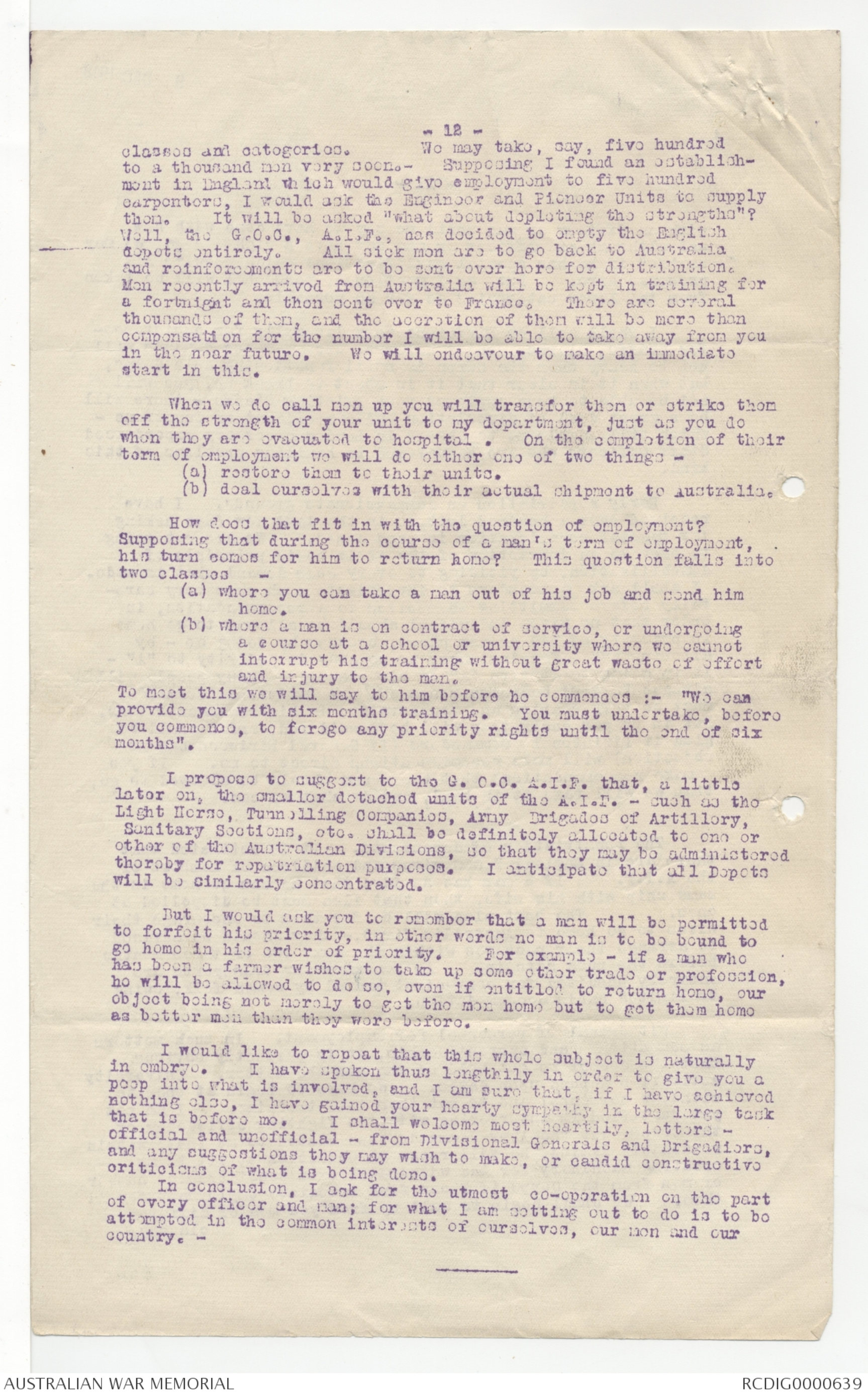
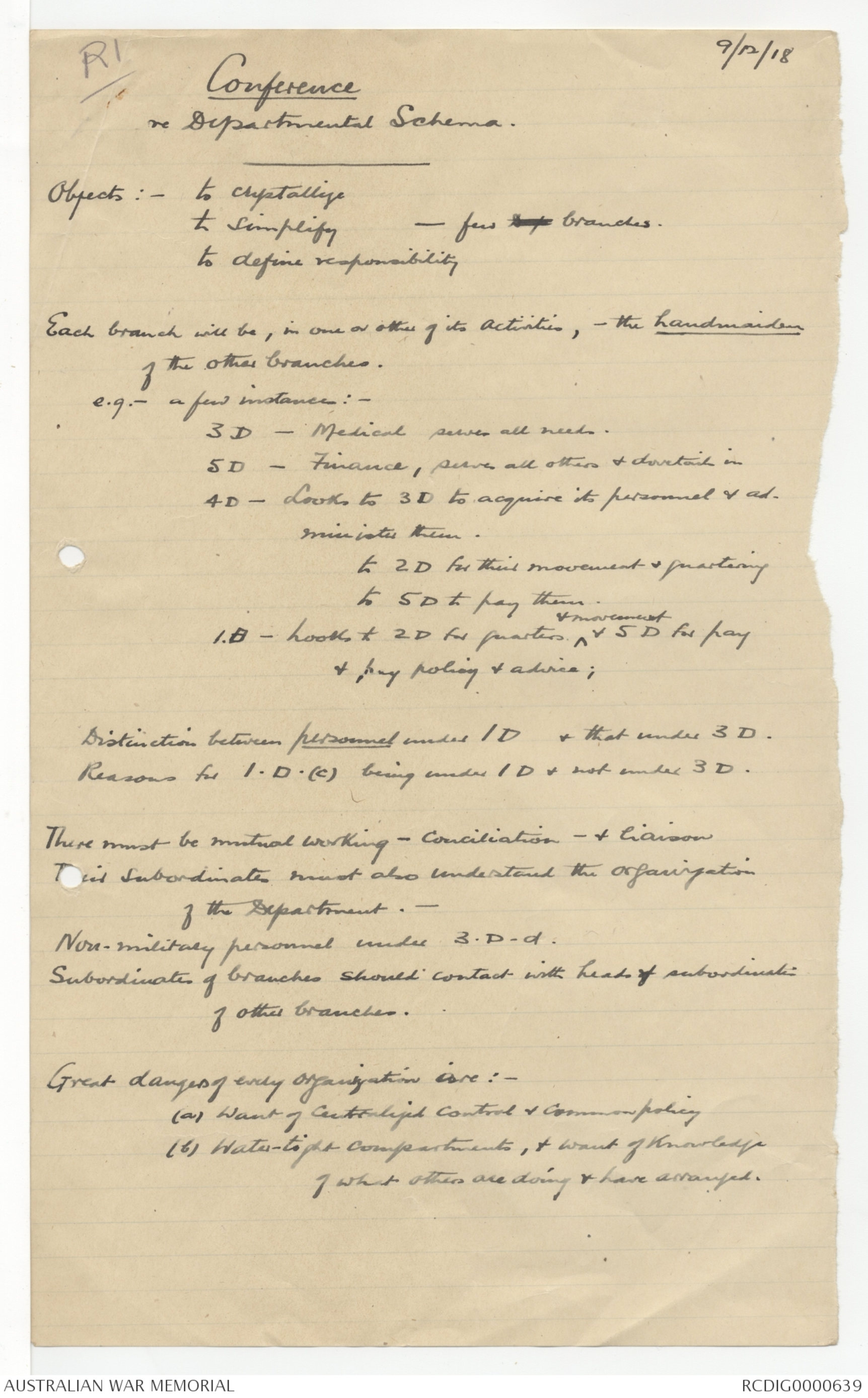
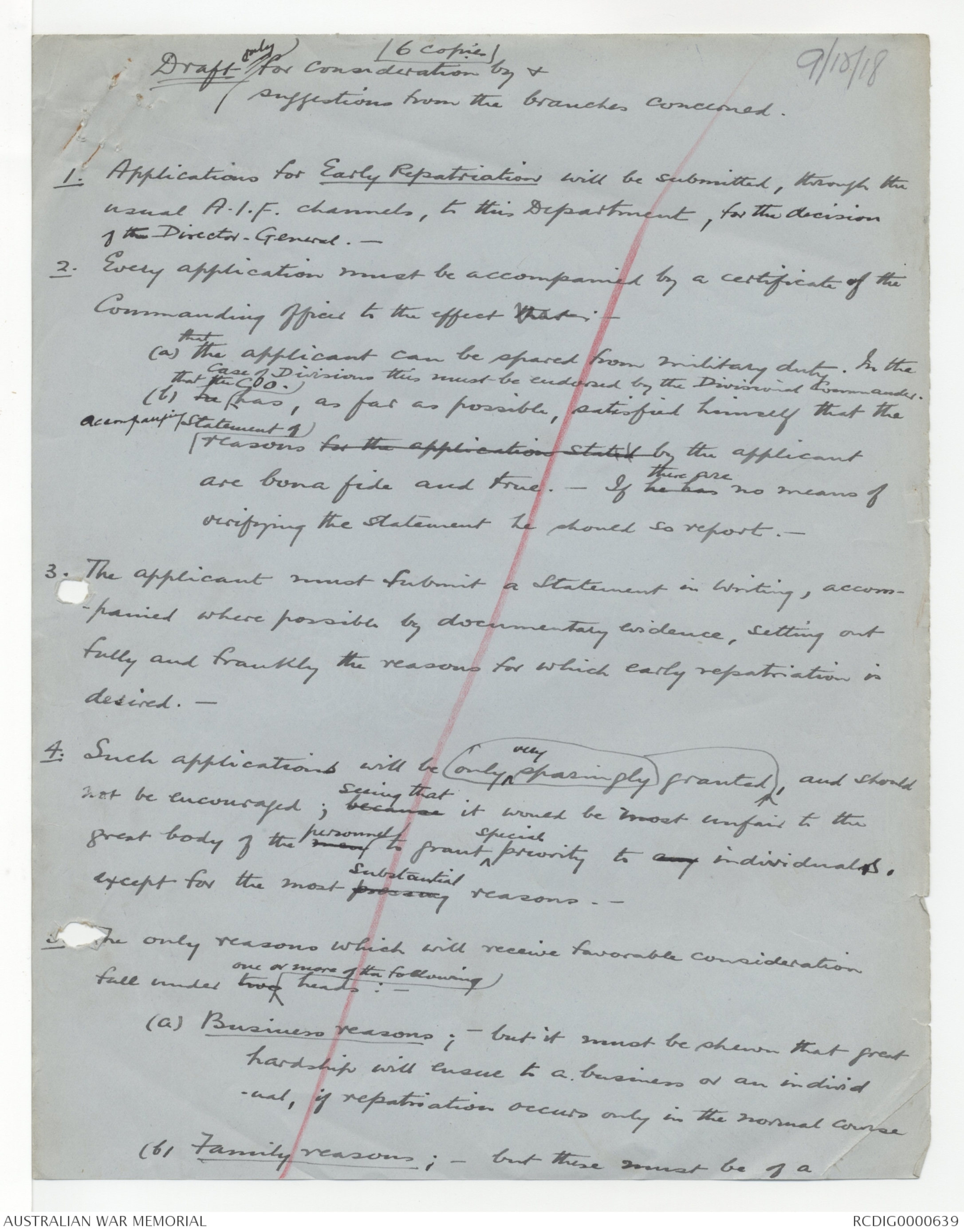
9 DEC 1918
-5 -
and care for all personnel withdrawn from the field, or from
the depots, for the purpose of commercial, industrial or
educational employment. There will be be an Ordinance Branch
to look after war equipment and its shipment to Australia.
There will be a Transport and Quartering Branch, which will
deal with shipping, arrangement of ports of embarkation, etc.,
and will control the moves from this end and from Egypt. There
will be a Medical Branch, a Veterinary Branch, and a special
Branch for the Flying Corps - the future Australian policy in
regard to the air service, equipment, etc will have to be dealt
with by it. A Finance and Pay Branch, and finally, but
not the least important, an Employment Branch, which term I
use in its very broadest sense as being for the employment of
the Officer or man in a non-military sense, whether educationally
by teaching him, or industrially by giving him work to do.
Later I shall develop this question of employment more fully.
General Birdwood has agreed that I should be permitted
to have direct communication with all formations of the A.I.F.
with due regard to preserving the existing chain of responsibility
in every way.
The policy of the Repatriation and Demobilization Department
will have to be steadily and methodically built up, but unlike
our experiences of the war where the presence of the enemy and the
needs of secrecy have prevented our taking subordinates into our
confidence, now the absolute reverse policy will be be enforced and
everybody that matters will be told everything we possibly can
tell them about our policies, our decisions and our arrangements.
These policies will be announced to you in the form of memoranda,
and I will ask you to arrange within your formations that they
be properly kept and filed, so that each Commanding Officer will
have at hand a complete declaration of the whole of the decisions
that have been arrived at. Everything will be carefully
considered and studied in all its bearings, but I have no doubt
but that the policies which will hold good for December may have
to be revised in January or February and so on. You will be
taken fully into our confidences.
So much in a perfectly general way. I will now deal with a
few basic question. I think that on matters of this kind the
men should be told as much as possible and as soon as possible.
Our task is to repatriate 200,000 individuals, and in addition
to collect and transport the war equipment, of our 5 Infantry
Divisions and of the Mounted Division. When can this task
be commenced? Clearly not until Peace is signed. G.H.Q. is
wisely emphasizing the point that the War is not yet over, but
that we must remain in a condition of readiness, and that there
can therefore be no thought of demobilizing the Army - no such
thought can be entertained - until at least the peace preliminaries
have been signed. When will that be?
( General Birdwood at this stage mentioned that they had secured
shipping for 11,000 men between now and the end of the year,
but that this arrangement formed no part of the demobilization
scheme. It was estimated that 7,000 berths would be required
for men now sick in England. The remanning space would be
filled by "B" class personnel, by underage soldiers , and by
men who embarked from Australia early in 1915 and who had not
since returned home for any reason )
As/
-6 -
As General Birdwood has said, that is not "demobilization".
You will quite realize that the pressing need in Australia is for
materials, and that the pressing need in England is for
raw materials. Much shipping is being made available quickly
but the demobilization proper cannot commence until at least
peace preliminaries have been signed. It would appear that
this cannot be before the beginning of February. and may perhaps
not be until the end of February. Having estimated at what
earliest time we could commence - the beginning of February -
at what rate shall we be able to send the men home? That
depends upon the shipping available, and there will be a very
heavy demand by all nations, and for all purposes, on all
available tonnage. That is an Imperial question; in fact
it is an international question. Great Britain must be
prepared to take her share of tonnage, and the Shipping Control
will allot certain proportions to Australia. Our position is
likely to be relieved by the necessity, which I mentioned, of
bringing from Australia to England a great amount of wool, wheat
and meat. Therefore, sufficient shipping may possibly be
available to carry the whole of the troops back to Australia a
in six or nine months. But that is not the only consideration.
We have also to consider the capacity of Australia to absorb
the men, for it would be a great disaster, to have dumped in
Australia 200,000 men, who were either without employment
themselves, or who would displace from employment those new
employed. What is more, the great majority of men who are
now in France will not be able to find employment until there
have been obtained raw materials on which they can work. The
carrying of men and of raw materials must go hand in hand.
This is a matter of high policy on which I cannot give you any
determination. You may take it quite definitely, however,
that the actual period of transport of the whole of our troops
from this end of the world to the other, is likely to be spread
over a period of twelve months , so that if the first man gets
away on the Ist February, 1919, the last man will not go before
the lst February, 1920 - not from the point of view of shipping,
but from the point of view of the ability of Australia to absorb
them. This means that in 3 months from date, making the
fullest use of opportunities for getting rid of munition workers
and dependents, and sick, and "D" class personnel, we will still
have left on our hands on the 1st March next over 150,000 men.
and if you look ahead three months further, on the lst June there
will still remain at least 100,000 men. I speak of course of
England, France and tho East.
What are we going to do with this enormous number of men?
It is an unparalleled problem, and I think there is only one
solution. As far as we possibly can, we must set to work
methodically to find useful employment for all of them. We
cannot go on drilling them and giving them route marches etc,-
that is out of the question. We would ruin their capacity for
becoming useful citizens again. In short this is the real
problem we are up against. There is a most pressing necessity
for some organization to be set up at once to find the means of
providing useful and beneficial employment for all these men,
and that is what my chief business will be.
I /
9 DEC 1918
-7-
I think that, for the purpose of consideration, we may
divide the men roughly into three categories. The first
category may be taken to comprise eighty perent of our men -
men who are only too ready and willing to undertake employment
or education - such a high percentage, at any rate, after the
matter has been explained to them. Then there is a smaller
category of men who will be willing also if they are sufficiently
coaxed and persuaded - they will require to be carefully handled
and this can best be done by their Commanders. A still smaller
category of derelicts and bad characters will probably have to
be concentrated, and kept under the strictest military discipline
to keep them out of mischief. We must legislate for these
different classes.
Commanders will have sooner or later to address themselves
to this subject. What employment can be made available?
We have Education, which will become part os the Demobilization
Department, and will embrace :-
Commercial training.
Preparing men for academic careers.
University Courses.
Professional or vocational training.
Then Industrial employment comprising :-
Commercial employment. Numbers of applications have
already been received from men who have positions in
England open to them.
Scientific employment.
New apprenticeship : young fellows willing to be
indentured for some trade.
Men who have broken their apprenticeship, or whose term
of apprenticeship has been arrested, and who wish to
continue in their trade.
Wage-earning in a man's present trades.
Learning of new trades: this is of special importance
to Australia, who in future intends to open up new
industries, such as tin-plate making, ship-building.
And the men should be encouraged by Commanding Officers
to take up employments of this kind.
Agricultural and rural industries of many kinds, both as
owner and as subordinate.
Commonwealth Workshops. The Commonwealth proposes to
establish workshops, stores, etc.
How are we going to carry out all this while continuing as a
military organization ? It is an ideal scheme, and is full of
difficulties. Financial difficulties are not very serious,
because this business is worth doing well, and after all, if it
costs a couple of millions sterling, that will only amount to the
costs of a couple more weeks of war. We do not know what the
industrial conditions in England and France will be after the
War. A great body of expert economic opinion considers that
there will be a tremendous industrial boom in England - greater
than had ever been known before. The War Office
Authorities believe that so firmly that they have framed their
policies andplans on that basis, i.e., that they will be very able
-8-
very rapidly to absorb men from France into British industries.
I do not know whether this will apply also to Australia. But
whether it be true or not true, it is going to be a very important
factor in our policy of finding employment at this end of the
world for our men. If true, we should have no difficulty in
placing large numbers of our men in the occupations of their
trades under such financial conditions as will be attractive
to them. We are, however, faced with another difficulty.
That is the difficulty in regard to Trade Unionism. If we
give our men better terms and conditions there will be trouble
with the British Trade Unionists, and if we give our men less
good terms, our men will be dissatisfied. Steps have been
taken to get into touch with British Trades Unions with a
view to arriving at agreement to these questions.
Then there is the attitude of the man himself. There
is the man who says " I feel very comfortable in this camp -
the Government are paying me - I prefer to stay where I am and
I do not care how long ". That is the man who must be specifically
dealt with. And how are we going to do it? By launching
a propaganda. We have a very considerable amount of
machinery for propaganda already in existence. The most
obvious machinery is the present military organization. The
prestige of the men's own Officers. Therefore, you must get
at the regimental Officers and lead them into the right frame
of mind. They will have to get at their men and keep them
from the attitude of mind of saying "we will be loafers and
sponge on our country as long as we can".
Apart from these military channels we have the Educational
Staff, who have done an enormous amount of useful work - and
few people realize what Bishop Long and his staff have already
done in this respect. We also have our Chaplains, and I
would like Brigade Commanders to see the Chaplains , so that
their influence may be brought to bear. We have in addition
members and ex-Members of Parliament in the A.I.F. These are
public men with public responsibilities and I propose, after
seeing some of them, to arrange for them to visit units to talk
to the men from a broad national point of view.
There is, however, a class of man who is likely to be
suspicious of the propaganda. I refer to the Unionist - the
political Labour Unionist. We cannot get at him any better
than by letting loose on him men of his own class. I want
particularly to get hold in every unit of some good representative
man - N.C.Os., privates or gunners who are good speakers and
and who are "personae gratae" with that particular class, and
who are likely to carry personal influence with the men from
the industrial and economic point of view. I would like you
to obtain the names of one or two in every unit and send their
names to me . I will make arrangements to have them brought to
London, to investigate the whole question, and I will then ask
you to facilitate their addressing meetings of the men. I
want the men in the ranks, no matter to what class of society or
politics he belongs, to believe that this is a National matter,
into which politics do not enter at all, but in which we
necessarily must have regard to a man's political creed, in
order to persuade him thaat our motices are unselfish. I shall
prepare in London a series of short lectures on the whole question
from a National point of view and these will be circulated to you
I /
9 DEC 1918
-9-
I would ask you to put them into the hands of your Officers
and to ensure that the men are made fully conversant with their
contents. We should then very soon be able to switch the
men's thoughts from war to reconstruction, and to create in their
minds a wish to do everything they can to help.
I do not know whether you have yet received the A.I.F.
Demobilization form. This form asks a number of very pertinent
questions, one of which is "Are you a Unionist"? The filling
up of a form like this in a perfunctory way, as one of these
multitudinous forms in existence, would render nugatory the
whole object which it is desired to achieve. I wish these
forms to be treated very seriously. They will be the raw
material that we are going to work on. Officers must "mother"
their men, and advise them. They must try to encourage them
to improve their position & prospects in life.-
( General Birdwood at this stage stressed the importance
of accuracy and rapidity in filling up this form. He
stated that the delay in its issue occurred in Australia,
as the Government at first queried the insertion of the
question "Are you a Unionist". It rests entirely with
the soldier as to whether he answered this question - it
is quite optional.)
We wish to be able to place all Unionists in Unionist
Shops, and non-unionists in non-union shops, and the answering
of this particular question is intended to facilitate this.
The men should be made quite clear on the point that it is not
out of any mere curiosity that this infomration is desired. Will
you please, therefore, take every care in the filling up of the
form. Nor will it be the last form, by any means, that you
will be asked to complete.
Now, a few words about the procedure. The first thing
we shall have to do will be to establish a definite priority
of selection as a basis for the actual order of repatriation.
This is a very difficult question. There are dozens of
conflicting policies. Is it to be done by units ? By a man's
marital condition? By occupation? By the fluctuating needs
of Australia - as, for instance, shearers being required in the
wool season? Most countries intend to work on the "occupational
group" system. Australia is inclined to favour demobilisation
by units, but it has qualified that by saying that the demobilization
must take place"by half-units in categories of priority."
(General Monash at this stage outlined the probable
categories which would be adopted; married men with
children being given first preference, and long service
being given priority over ensured employment)
Thus each man will have a definate claim to a particular degree
of priority. "A" will have the right to go before "B", and so
on. If we have to demobilize by half units, then, in a
Battalion which is, say, 600 strong, 300 men who have priority
would go together in a bunch when their time comes. The other
300 who fall into the lower categories would go away together in
a bunch later. That is what ought to happen, if it were not
for a number of disturbing factors. I foreshadow that the Unit
principle is to be the basis, so far as it is consistent with the
working of the repatriation by priority of selection, and with
the /
-10-
the question of employment. All men of a given category and
of a given Unit will if possible go home together. Such things
as organized whole Unit marches through Brisbane, Sydney, etc. ,
will, I fear, be entirely out of the question. For,having
taken out the cadres, ordinance personnel, duty personnel, etc.etc.
there will not be many of the Unit left. However, the sentiment
of sending a Unit home together will be adhered to as much as can
be. The first half of "1915" men will probably go away in
lieu of leave before the definate demobilization starts - in
order to fill up the ships.
I trust that everybody will agree with me that, in whatever
splitting up is necessary, we ought to keep bands together, and
concert parties and pierrot troupes intact.
The probability that every C.O. will be called upon to
arrange his personnel in sequences of priority from "A" to "Z",
being bound by certain rules of priority laid down by the
Government, which must be adhered to rigidly - and then at any
time when he is called upon to send two or three hundred men (who
are not ear-marked for any duty) to a Concentration Camp, he must
be ready to do it.
The Unit Commander will be primarily responsible, and he
will have to be prepared to carry the burden of his decision and
make it fully known to the men. He must be able to settle
internally all grievances and complaints. There are bound to
be isolated cases of grievances, and false decisions by subordinate
officers, which will have to be smoothed out when brought to notice.
We shall also require a very considerable duty personnel,
and there can be no question of allowing any one to go home, if
his services are required here. There will be the Unit cadres,
by which I mean the personnel which will administer the Unit to
the end.- the squaring up of Canteen and Regimental Funds,
Quartermaster's Stores, Battaliion or Unit records, etc. That
cadre will have to remain to the end, not necessarily specific
individuals, but the cadre must remain. Demobilization
personnel,- this body of officials will be very numerous, not
only at Headquarters and at the Concentration Camps, administering
the demobilization procedure but also there will be large numbers
who will have passes the Department for "employment".
Transport personnel will require to be held back to staff ships.
We must retain at this end of the world sufficient staff for the
last ship to leave. Ordnance - a large personnel will be
required to look after the guns, stores, etc.
All such personnel should, as far as possible, be selected
from men of lower category. If it should happen that the right
man is what we might term an "old" man, he must be prepared to
serve, if necessary, for twelve or fifteen months longer. A
man's right is over-ridden by the demands made by the Demobilization
Department for duty personnel. That applies particularly to
Officers. There is a large number of Officers in the A.I.F.
who are men of independent means, who want, now that the armistice
is signed and they consider their jobs finished, to get home.
No Officer or man is to be permittd to acquire the idea that we
have done with him until it is so stated. We will not have done
with /
9 DEC 1918
-11-
with an Officer or man until we say we have done with him,
and although an Officer or man may have a right to go, we may
so "No" if he has special qualifications which require his
presence here. But , as I mentioned, personnel will be taken
from the lower categories as far as possible.
I shall call on Divisions very liberally for assistance-
for staffs, clerks, junior helpers, etc. These demands will
not be heavy when the Corps is still functioning as a Corps,
but when it is clear that it is about to break up, you will
not be able to keep employed your existing staffs - there will
be a great deal of dissolation and curtailment of functions -
which will enable me to absorb in London necessary experienced
Staff Officers who are accustomed to handling problems of this
kind.
Early repatriation on compassionate grounds. I have
received over a hundred letters in the last few days asking
for special consideration in such cases. We are not going
to provoke an infraction of the whole basic principle of
demobilization, by yielding to every such demand that is made.
I shall ask Commanders to investigate each case very carefully
before commiting themselves to a recommendation, in
order that no given individual should be allowed to go home
in priority of his proper place, because by doing so - by
allowing "M" , for instance, to go away in priority to "A" -
it is going to deprive "A" of his place. Many people will
advance "urgent business reasons". A Divisional Commander
must be very sparing and conservative in his recommendations.
But in proper cases they will be considered, and I shall be
glad if Divisioal Commanders (if General Birdwood has no
objection) will make recommendations direct to me. If you
make recommendations that those men should be allowed to go,
then we will take it in hand, and do what we can.
The repatriation of dependents. It is estimated that
there are in England 7,000 wives and children of members of
the A.I.F. If a man has an idea that he can go home in the
same ship with his wife, then that idea must be dispelled at
once. The best plan will be for them to encourage their
wives to go home to Australia first,- they should be advised
to arrange their passages within the next two or three months
before the rush sets in. As you know our transports are
entirely unsuited for convenient travel by women folk, owing
to limited cabin accommodation.
Withdrawal of personnel for employment. In such matters
as education and apprenticeship, it is perfectly obvious
that the sooner we get hold of the men the better. University
activites depend upon dates. We have to begin at once to
withdraw personnel and to put them into training. I am not
yet justified in interfering with the fighting efficiency of
the Corps, but the Army Commander has stated to me that, within
reasonable limits, he will raise no objection at all to my
operating machinery for the withdrawal of a considerable number
of men from the Corps if I can find immediate employment for
them. We shall begin to call up from men of different
classes/
-12-
classes and categories. We may take, say, five hundred
to a thousand men very soon.- Supposing I found an establishment
in England which would give employment to five hundred
carpenters, I would ask the Engineer and Pioneer Units to supply
them. It will be asked "what about depleting the strengths"?
Well, the G.O.C., A.I.F., can decide to empty the British
depots entirely. All sick men are to go back to Australia
and reinforcements are to be sent over here for distribution.
Men recently arrived from Austraalia will be kept in training for
a fortnight and then sent over to France. There are several
thousands of them, and the accretion of them will be more than
compensation for the number I will be able to take away from you
in the near future. We will endeavour to make an immediate
start in this.
When we do call men up you will transfer them or strike them
off the strength of your unit to my ddepartment, just as you do
when they are evacuated to hospital. On the completion of their
term of employment we willl do either one of two things -
(a) restore them to their units.
(b) deal ourselves with their actual shipment to Australia.
How does that fit in with the question of employment?
Supposing that during the course of a man's term of employment,
his turn comes for him to return home? This questionb falls into
two classes -
(a) where you can take a man out of his job and send him
home.
(b) where a man is on contract of service, or undergoing
a course at a school or university where we cannot
interrupt his training without great waste of effort
and injury to the man.
To meet this we will say to him before he commences :- "We can
provide you with six months training. You must undertake, before
you commence, to forego any priority rights until the end of six
months".
I propose to suggest to the G.O.C. A.I.F. that, a little
later on, the smaller attached units of the A.I.F. - such as the
Light Horse, Tunnelling Companies, Army Brigades of Artillery,
Sanitary Sections, etc. shall be definately allocated to one or
other of the Australian Divisions, so that they may be administered
thereby for repatriation purposes. I anticipate that all Depots
will be similarly concentrated.
But I would ask you to remember that a man will be permitted
to forteit his priority, in other words no man is to be bound to
go home in his order of priority. For example - if a man who
has been a farmer wishes to take up some other trade or profession,
he will be allowed to do so, even if entitled to return home, our
object being not merely to get the men home but to get them home
as better men than they were before.
I would like to repeat that this whole subject is naturally
in embryo. I have spoken thus lengthily in order to give you a
peep into what is involved, and I am sure that, if I have achieved
nothing else, I have gained your hearty sympathy in the large task
that is before me. I shall welcome most heartily, letters -
official and unofficial - from Divisional Generals and Brigadiers,
and any suggestions they may wish to make, or candid constructive
criticisms of what is being done.
In conclusion, I ask for the utmost co-operation on the part
of every officer and man; for what I am getting out to do is to be
attempted in the common interest of ourselves, our men and our
country. -
______________
9/12/18
R1
Conference
re Departental Schema.
_____________________
Objects :- to crystallize
to simplify - few xxx branches.
to define responsibility
Each branch will be, in one or other of its activites, - the handmaiden
of the other branches.
e.g.- a few instances:-
3D - Medical serves all needs.
5D - Finacne, serves all others & dovetails in
4D - Looks to 3D to acquire its personnel & administers
them.
to 2D for their movement & quartering
to 5D to pay them.
1.D - Looks to 2D for quarters ^& movement 5D for pay
& pay policy & advice;
Distinction between personnel under 1D & that under 3D.
Reason for I.D.(c) being under 1D & not under 3D.
There must be mutual working - Conciliation - & Liaison
Their subordinates must also understand the organization
of the Department.-
Non-military personnel under 3.D.d.
Subordinates of branches should contact with heads of subordination
of other branches.
Great dangers of every organization are :-
(a) Want of Centralized control and Common policy
(b) Water-tight compartments, & want of knowledge
of what others are doing & have arranged.
9/18/18
6 copies
Draft only for consideration by &
suggestions form the branches concerned.
1, Applications for Early Repatriation will be submitted, through the
usual A.I.F. channels, to this Department, for the decision
of the Director-General. —
2. Every application must be accompanied by a certificate of the
Commanding Officer to the effect that : —
a) that the applicant can be spared from military duty. In the
case of Divisions this must be endorsed by the Divisional Commander.
(b) ^that the C.O. he has, as far as possible, satisfied himself that the
accompanying statement of reasons for the application stated by the applicant
are bona fide and true. — if he has there are no means of
verifying the statement he should so report. —
3. The applicant must submit a Statement in Writing, accompanied
where possible by documentary evidence, setting out
fully and frankly the reasons for which early repatriation is
desired. —
4. Such applications will be only very sparingly granted, and should
not be encouraged; because seeing that it would be most unfair to the
great body of the men personnel to grant ^special priority to any individuals.
except for the most pressing substantial reasons. —
5. The only reasons which will receive favorable consideration
fall under two ^one or more of the following heads: —
(a) Business reasons; but it must be shewn that great
hardship will ensue to a business or an individual,
if repatriation occurs only in the normal course
(b) Family reasons; but these must be of a
 Sandy Mudie
Sandy MudieThis transcription item is now locked to you for editing. To release the lock either Save your changes or Cancel.
This lock will be automatically released after 60 minutes of inactivity.